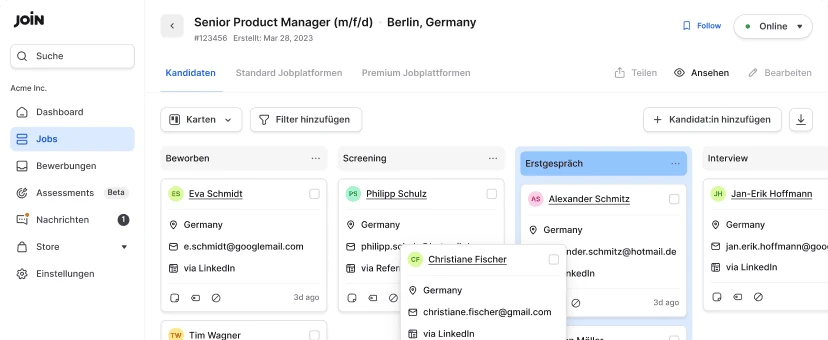Best interview questions for your hiring process
Chief Operating Officer Interview questions
The Chief Operating Officer (COO) oversees a company’s Operating and works with senior management to create a growth strategy. The COO must be strategic, a leader, and a visionary who can establish procedures to achieve the company’s primary goals.
These are a few of the most important skills to look for in a Chief Operating Officer:
- Experience leading an operational strategy
- Strong people and management skills
- A history of analysing and reporting on Operating
- Strong understanding of different operational roles
- Strong industry knowledge
- Ability to create operational timelines
Interviewing a Chief Operating Officer
When you are interviewing for a CMO position, a candidate must have a solid knowledge of the overall operational department. The candidate also needs to be sure that they can explain how they will onboard, oversee and help to train people on their team, especially if this is their first C-Level position.
Therefore, having a number of questions prepared for a COO role is critical. That’s why we’ve put together these examples of Chief Operating Officer interview questions and answers, to ensure you’re making the right decision.
How to open the job interview
Even at such a senior level, the interview process can cause some nerves. However, making a candidate too uncomfortable can hinder your impression of your candidate. So, to combat this, why not open the interview with some laidback questions such as these:
Best interview questions for your hiring process
See our example Chief Operations Officer job description hereFor the interview
A positive opener to start
What do you enjoy most about working in operations?
What do you enjoy about working at such a senior level?
Behavioral Questions
Name a time you changed the way an operations team was structured, which had a positive impact on the team.
Tell me about the most challenging decision you’ve had to make when leading an operations team.
Overseeing an entire operations team often involves making challenging, rapid decisions. This question aims to decipher whether your potential COO has experience in this area.
Tell me about a time you had to deliver difficult news to a team.
When working at the board level, an individual has to deal with breaking both good and bad news. Here, you’ll know whether your COO has the people skills needed to do this.
Talk me through a time when a team hasn’t agreed with your strategic operational decision; what did you do?
As a leader, your COO must be an expert in their area, and able to back up their decisions with facts and statistics, as well as have the collaboration skills needed to take any concerns on board.
Soft Skills
How do you prioritise requests from multiple senior members of staff?
COOs have a lot of responsibility, and many senior members of staff will turn to them for guidance. Knowing they can prioritise based on deadlines, ROI, and other factors is essential.
What steps would you take if you noticed the operational department seemed to be struggling with their motivation?
Here, you’re looking for instant and appropriate action. Operational teams are key to a business functioning properly, so ensuring they have what they need to perform their role as well as possible is essential.
What skills do you have that are important as a Chief Operating Officer?
Here, a candidate will name their relevant leadership and operational skills, whether they’re soft skills or hard skills.
When explaining a technical part of an operational strategy to those with less experience in the area, how do you ensure they’re understanding?
Communication skills are essential in a COO. Here they should mention providing plenty of examples and time for questions, among other things.
Hard Skills
What is the largest operational department you have led? Were you comfortable with this?
Operational teams vary in size from company to company and knowing your candidate’s experience will help you better assess their fit in your business.
Do you specialise in any operational area?
A COO needs to have all-around knowledge. However, they may have a deeper experience in certain areas.
Which operational tools and systems have you worked with in the past?
This gives you a better understanding of how a candidate will fit into your team, and what new skills they will bring to the department.
Which people management systems have you had experience with?
Again, you will find out whether a candidate needs to be onboarded with any tools, or if they can bring any new skills.
Do you have any experience with hiring and training an Operating team from scratch?
This will be especially relevant in a start-up or small business.
Operational / Situational Questions
If you were required to hire for a senior Operating role you didn’t have any hands-on experience in, how would you ensure you were making the right decision?
Here your COO can mention researching the position, or bringing someone with more knowledge into the hiring process.
If you noticed that a certain senior team member was not performing to expectations, how would you proceed?
Here, time is of the essence. Creating an improvement plan with the relevant team member will allow their performance to be improved and evaluated.
When communicating with external stakeholders in regards to Operating, how do you ensure you keep confidential information safe?
A COO should have tried and tested confidentiality techniques prepared that they can mention here.
If you were to join our team as a Chief Operating Officer, what would your first steps be?
The COO should spend some time familiarising themselves with current business strategies and practices, getting to know the senior team and their needs, as well as making introductions with other stakeholders.

Start hiring and prepare your interview
All platforms are available for you to promote your job through JOIN.
Create job ad for free


A COO will often have to make structural changes to ensure that the operations team is functioning to its full potential. This question will measure whether a candidate has experience in this area.